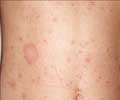Highlights
- Exposure to ultraviolet rays is a main risk factor of skin cancer.
- Carvedilol drug is a beta blocker that is used for treating hypertension.
- Scientists have found carvedilol drug to have cancer-fighting properties.
The annual meeting is presented at the Experimental Biology 2017 meeting which is held between April22-26 in Chicago.
Bradley T.Andresen, PhD, said, "What began as an experimental error led to a very interesting scientific discovery."
"Our research could lead to the development of a class of new cancer-preventive agents."
Discovery of Cancer-Fighting Properties in Carvedilol
The cancer-fighting properties of Carvedilol drug were discovered when a graduate student in Huang’s lab studied whether beta blockers or carvedilol could increase the risk of cancer.
The study findings surprisingly showed protective effects against skin cancer.
The research team conducted various experiments to find out if carvedilol could prevent skin cancer caused by ultraviolet-B (UVB) rays.
Ultraviolet rays are a portion of sunlight that is capable of damaging the epidermal layers of the skin and plays a major role in skin cancer.
Study Findings
The study findings revealed that
Carvedilol drug shows a protective effect in the cultured mouse skin cells exposed to UVB and in hairless mice the drug is given after UVB exposure.
The drug is found to mainly act by protecting the cells against the cancer-causing DNA damage and cell death by the ultraviolet B rays.
The hairless mice which are exposed to the ultraviolet rays and carvedilol may show a decrease in both the severity and the number of tumors which develop when compared to those patients who are not given carvedilol.
The studies also showed that carvedilol delayed skin tumor formation more than the sunscreen.
The research team also identified that not all the beta blockers may have cancer preventive properties.
Andresen, said, "We have preliminary data indicating that the cellular targets for carvedilol are not related to the beta-adrenergic receptors that are the commonly accepted targets for all beta blockers."
"They likely target unexpected mechanisms involved in cancer development."
Incorporating Carvedilol Drug in Skin Creams or Sprays
Scientists have found that incorporating the carvedilol drug or similar beta blockers in skin creams or sprays could prevent skin cancer that arise due to UV light exposure.
This treatment would directly act on the skin without affecting the heart rate or blood pressure which could be altered by beta blockers.
By understanding how the drug works, scientists would be able to design new treatments without any cardiovascular effects.
Interesting Facts on Skin Cancer
- Skin cancer is one of the most common cancers in the United States.
- One out of five Americans may develop skin cancer in their lifetime.
- Sun exposure is the main risk factor of developing skin cancer.
- Melanoma is the main reason for a vast majority of skin cancer deaths
- Causcasians and men older than 50 years have a higher risk of developing skin cancer.
- Skin cancer - (https://www.aad.org/media/stats/conditions/skin-cancer)
- Did You Know... The Facts About Skin Cancer - ( https://www.oncolink.org/cancers/skin/melanoma/support-and-resources/did-you-know-the-facts-about-skin-cancer)
Source-Medindia















